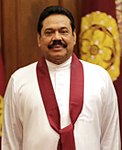| ||||||||||||||||||||||||||||||||||||||||||||||||||||||||||||||||||||
8,327[i] seats across 340 local authorities | ||||||||||||||||||||||||||||||||||||||||||||||||||||||||||||||||||||
|---|---|---|---|---|---|---|---|---|---|---|---|---|---|---|---|---|---|---|---|---|---|---|---|---|---|---|---|---|---|---|---|---|---|---|---|---|---|---|---|---|---|---|---|---|---|---|---|---|---|---|---|---|---|---|---|---|---|---|---|---|---|---|---|---|---|---|---|---|
| Turnout | 79.94% | |||||||||||||||||||||||||||||||||||||||||||||||||||||||||||||||||||
| ||||||||||||||||||||||||||||||||||||||||||||||||||||||||||||||||||||
Local elections were held in Sri Lanka on 10 February 2018.[3][4] 15.7 million Sri Lankans were eligible to elect 8,327[i] members to 340 local authorities (24 municipal councils, 41 urban councils and 275 divisional councils).[5][6] It was the largest election in Sri Lankan history.[5][7] This was also the first election under the mixed electoral system where 60% of members were elected using first-past-the-post voting and the remaining 40% through closed list proportional representation.[8][9]
In a surprise result, the newly formed Sri Lanka Podujana Peramuna, led by former president Mahinda Rajapaksa, came first, winning 40% of the votes and securing the most number of seats and local authorities.[10][11][12] The United National Front led by Prime Minister of Sri Lanka Ranil Wickremesinghe came second with 29% of the votes whilst the United People's Freedom Alliance led by President Maithripala Sirisena came third with 12% of the votes.[12] However, most local authorities were hung with no overall control.[13][14]
Cite error: There are <ref group=lower-roman> tags or {{efn-lr}} templates on this page, but the references will not show without a {{reflist|group=lower-roman}} template or {{notelist-lr}} template (see the help page).
- ^ "Sri Lanka's Local Government Polls: Time To Send Signals?". The Sunday Times. Colombo, Sri Lanka. 9 January 2018. Archived from the original on 10 August 2019. Retrieved 14 January 2018.
- ^ Liyanagama, Lakdev (6 July 2017). "Waiting to Vote". Daily News. Colombo, Sri Lanka. Retrieved 14 January 2018.
- ^ "Local polls fixed on Feb 10". The Sunday Times. Colombo, Sri Lanka. 18 December 2017. Retrieved 23 December 2017.
- ^ Mudugamuwa, Ishara (19 December 2017). "LG polls on February 10". Daily News. Colombo, Sri Lanka. Retrieved 23 December 2017.
- ^ a b Jayasekera, Sandun A.; Bandara, Kelum (18 December 2017). "LG polls on February 10". The Daily Mirror. Colombo, Sri Lanka. Retrieved 23 December 2017.
- ^ Liyanagama, Lakdev (21 December 2017). "Selections before elections". Daily News. Colombo, Sri Lanka. Retrieved 23 December 2017.
- ^ Fernando, Manjula (10 December 2017). "LG polls, with several firsts". Sunday Observer. Colombo, Sri Lanka. Retrieved 23 December 2017.
- ^ Dissanayake, Chathuri (5 December 2017). "LG polls cost to hit Rs. 4 b". Daily FT. Colombo, Sri Lanka. Retrieved 23 December 2017.
- ^ Marasinghe, Sandasen; Mudalige, Disna (25 August 2017). "Amended Local Government Elections Bill approved in Parliament". Daily News. Colombo, Sri Lanka.
- ^ Riza, M. (11 February 2018). "Sri Lanka ruling alliance suffers defeat in local polls". Al Jazeera. Doha, Qatar. Retrieved 6 May 2018.
- ^ "Mahinda Rajapaksa heading for landslide victory in Sri Lanka local poll". The Indian Express. Noida, India. Press Trust of India. 11 February 2018. Retrieved 6 May 2018.
- ^ a b Kanakarathna, Thilanka (6 March 2018). "LG Election: SLPP obtained 40% votes; media miscalculated: Champika". The Daily Mirror. Colombo, Sri Lanka. Retrieved 6 May 2018.
- ^ Imtiaz, Zahrah. "Over 180 Local Govt. hung councils". Daily News. No. 14 February 2018. Colombo, Sri Lanka. Retrieved 6 May 2018.
- ^ "At least 160 LG bodies hung; decisive votes ahead says TISL". Daily FT. Colombo, Sri Lanka. 15 February 2018. Retrieved 6 May 2018.




